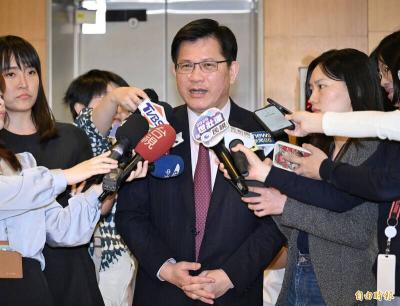The Chinese delegation to the just-concluded second round of talks on a proposed economic cooperation framework agreement (ECFA) between Taiwan and China headed home yesterday. China’s lead negotiator, Tang Wei (唐煒), declined to make any public comments prior to his departure.
Asked whether anything concrete had been achieved at the talks, Tang, head of the Department of Taiwan, Hong Kong and Macao Affairs under China’s Ministry of Commerce, only gave a polite “thank you all” in response.
To avoid pro-independence or anti-China protesters at Taiwan Taoyuan International Airport, the Chinese delegation arrived two hours before their flight was due to depart.
According to police authorities in Taoyuan, the Chinese delegation toured a tourist dairy farm in Yangmei Township (楊梅) yesterday morning before heading to the airport. For many of the Chinese negotiators this was reportedly their first visit to Taiwan.
The second round of ECFA talks began on Wednesday at Ta Shee Resort in Taoyuan County, and concluded at noon on Thursday, half a day earlier than originally planned.
At the end of the talks, Mainland Affairs Council Chairwoman Lai Shin-yuan (賴幸媛) expressed optimism about the prospects for signing the trade pact with China in June as scheduled.
Lai said the significance of the just-concluded negotiations lay in ensuring that no sector will be unduly impacted by the ECFA deal. She also indicated that more effort would be made in future rounds of talks to show which sectors will benefit from the deal.
The talks give form to the government’s promise over the past year that the “early harvest” program — a list of items for which duties will be reduced or exempted immediately — will not include any agricultural items that Taiwan does not import from China at present. It will also not include industries that cater to conventional domestic demand and would therefore be sensitive to new inflows of Chinese goods, she said.

Taiwan would welcome the return of Honduras as a diplomatic ally if its next president decides to make such a move, Minister of Foreign Affairs Lin Chia-lung (林佳龍) said yesterday. “Of course, we would welcome Honduras if they want to restore diplomatic ties with Taiwan after their elections,” Lin said at a meeting of the legislature’s Foreign Affairs and National Defense Committee, when asked to comment on statements made by two of the three Honduran presidential candidates during the presidential campaign in the Central American country. Taiwan is paying close attention to the region as a whole in the wake of a

Chinese Nationalist Party (KMT) Chairman Eric Chu (朱立倫), spokeswoman Yang Chih-yu (楊智伃) and Legislator Hsieh Lung-chieh (謝龍介) would be summoned by police for questioning for leading an illegal assembly on Thursday evening last week, Minister of the Interior Liu Shyh-fang (劉世芳) said today. The three KMT officials led an assembly outside the Taipei City Prosecutors’ Office, a restricted area where public assembly is not allowed, protesting the questioning of several KMT staff and searches of KMT headquarters and offices in a recall petition forgery case. Chu, Yang and Hsieh are all suspected of contravening the Assembly and Parade Act (集會遊行法) by holding

President William Lai (賴清德) has appointed former vice president Chen Chien-jen (陳建仁) to attend the late Pope Francis’ funeral at the Vatican City on Saturday on his behalf, the Ministry of Foreign Affairs said today. The Holy See announced Francis’ funeral would take place on Saturday at 10am in St Peter’s Square. The ministry expressed condolences over Francis’ passing and said that Chen would represent Taiwan at the funeral and offer condolences in person. Taiwan and the Vatican have a long-standing and close diplomatic relationship, the ministry said. Both sides agreed to have Chen represent Taiwan at the funeral, given his Catholic identity and

Taiwan would welcome the return of Honduras as a diplomatic ally if the next president of that country decides to make such a move, Minister of Foreign Affairs Lin Chia-lung (林佳龍) said today. “We would welcome Honduras if they want to restore diplomatic ties with Taiwan after their elections,” Lin said during a legislative hearing. At the same time, Taiwan is paying close attention to the Central American region as a whole, in the wake of a visit there earlier this year by US Secretary of State Marco Rubio, Lin said. Rubio visited Panama, El Salvador, Costa Rica and Guatemala, during which he